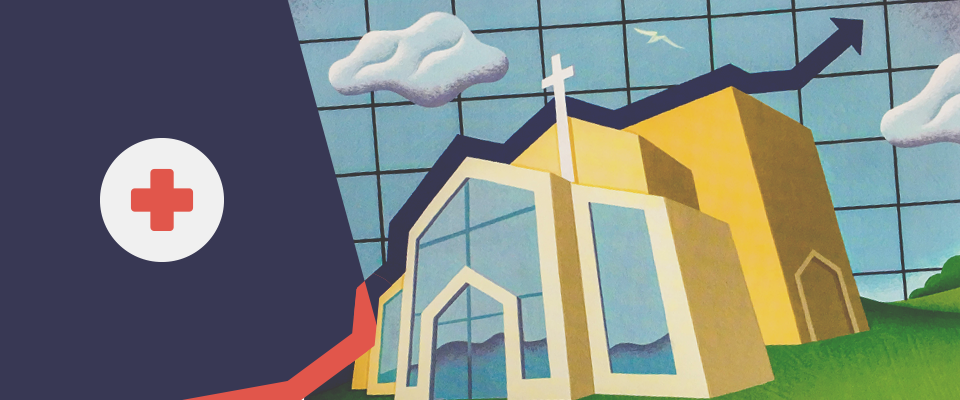It’s in the best interest of first-time borrowers and those who haven’t borrowed in a while to shop for a church loan with their eyes and ears wide open. One way to do that is to ask potential lenders as many questions as possible. You’ve heard it said there are no wrong questions, but when it comes to finding the best church loan, some questions are definitely better than others.

To guide you, we’ve compiled a list of 12 questions to ask lenders when shopping for a loan.
- Do you specialize in church loans?
Local banks and credit unions may not have expertise in church lending specifically. If they do not, you run the risk that your church will be seen as just another business transaction. A lender who specializes in church loans will see your church not as a business but as a ministry, with needs that deserve unique, flexible financing solutions. - How much can I afford to borrow?
Knowing what your project will cost is helpful, but it’s only half the equation. You also need to know how much debt your church can afford while still allowing for adequate monthly cash flow. Having enough cash flow will help you avoid ministry interruptions and delays in the coming years. - What happens to the interest on my loan?
Sometimes banking institutions use their profits to help fund political or social agendas, which may or may not fit with your own or your church’s spiritual convictions. In this case, it’s wise to know your lender. - Do you have loan payment amortizations that will fit with our future cash flow needs?
Amortization is the term used to indicate the amount of the scheduled monthly loan payment. You will want the payment to be manageable for your church without hurting your cash flow. It may be difficult to expand your church’s outreach if you’re struggling to make the mortgage payment every month. - Do you have long-term fixed rate loan terms that will protect our church for the future?
Perhaps even more important to understand is the loan term. This is the amount of time by which you must pay off your loan. Ask if the lender offers permanent financing for churches. In commercial lending, it's common to find loans that are purportedly fixed and permanent. This can be misleading. Many institutions assign their fixed rates to a very short loan term. This means that although your rate will not go up, you'll only have a few years to pay off the entire loan. A true permanent loan is a more stable arrangement with less financial risk to the church. This type of financing stands in stark contrast to short-term balloon notes—often misinterpreted as fixed-rate loans. Although these balloon notes may carry attractive interest rates, they come with a major downside: You must pay off the entire remaining loan amount in one lump sum (called a balloon payment) at the end of the loan term, which is usually only five years. If you can't pay off the loan, you will have to refinance, with all its associated costs and credit re-approval, just to borrow the same money again. It's a financially risky option for most churches and generally takes more time to pay off the loan in the long run. - How do you calculate your debt service coverage ratio when qualifying our church for a loan?
To decide whether or not you qualify for a loan, banks and credit unions generally evaluate your financial situation using the same ratios they use for businesses. In some cases, an institution could end up providing an inflated picture of your church’s available income—leading you to borrow more than you can comfortably afford. Additionally, certain aspects of a church’s finances, such as staff salaries, are left out of the equation altogether. Understanding how the institution decides how much money you qualify for will help you better understand your true borrowing capacity—the amount you can afford to pay back without cutting ministry and staff. - How long does the loan process take and do I need to adjust my project timeline to fit?
It’s exciting to make plans for the future, and congregations love to see quick progress. Realize the actual time frame from applying to closing on a loan may be longer than expected. You may not be able to start building as quickly as you may have expected. - To what extent can you offer flexibility in the event we experience unanticipated difficulty making payments?
This question must be brought up carefully, as you do not want to give a lender the impression that you are a financial risk to them. However, you need to understand their policies regarding late or missed payments and how willing they may be to work with your church if needed. This is another area where it becomes important to know your lender. An institution with which you have a strong relationship is more likely to extend flexibility or be willing to reach a new agreement during times of need. It could mean the difference between sinking and surviving. - What guarantee can you provide that our loan will be renewed after the fixed term period or balloon term?
If you can’t pay off the loan by the end of the term, you’ll have to refinance, paying all costs and fees again, as well as receiving a new interest rate based on the current market. A loan officer may tell you there will be no problem with renewing your loan when the term expires, but unless it is in writing, it isn’t a guarantee. If you know your church will need more than just a few years to pay off the full amount, it’s better to opt for a longer loan term, even if it means an adjustable rate. A rate cap will ensure the rate stays manageable while you take the necessary time to pay off the loan. - Do you offer rate caps?
A rate cap is a ceiling for an adjustable interest rate. Rate caps are in a church’s best interest. If a loan has a variable interest rate feature, it is important to protect the church from large increases in the interest rate. Although many variable interest rate loans offer attractive rates, beware of the impact to a church’s cash flow when the payment changes. A rate cap for both the adjustment period and a maximum for the life of the loan is important. - Are there prepayment penalties or termination fees?
Often low interest rates come with conditions. Look closely at the fine print to see if one of those conditions is a penalty for paying off your loan sooner than anticipated. Lending institutions enforce these penalties to ensure they receive a certain amount of money from the borrower. Sometimes the penalties can be disguised as interest rate termination fees or other third-party fees if the loan is pre-paid prior to the end of the loan term. - What additional services do you offer?
The answer to this question will help you distinguish between the many lending institutions available to you. Look for services that go beyond the funding of your project. Can they refer you to qualified building firms and architects? Do they offer help to manage the disbursement of funds? Do they provide consultation for planning, design, or construction? Can they provide consultation on a stewardship initiative to help raise funds internally?
While there are many questions you could ask potential lenders, these 12 will help you evaluate how different institutions compare within the unique world of church lending. As you shop for your next loan, make sure your questions serve to protect and build your ministry.
To explore church financing options, call 888.599.6015 to speak to one of our loan consultants.



